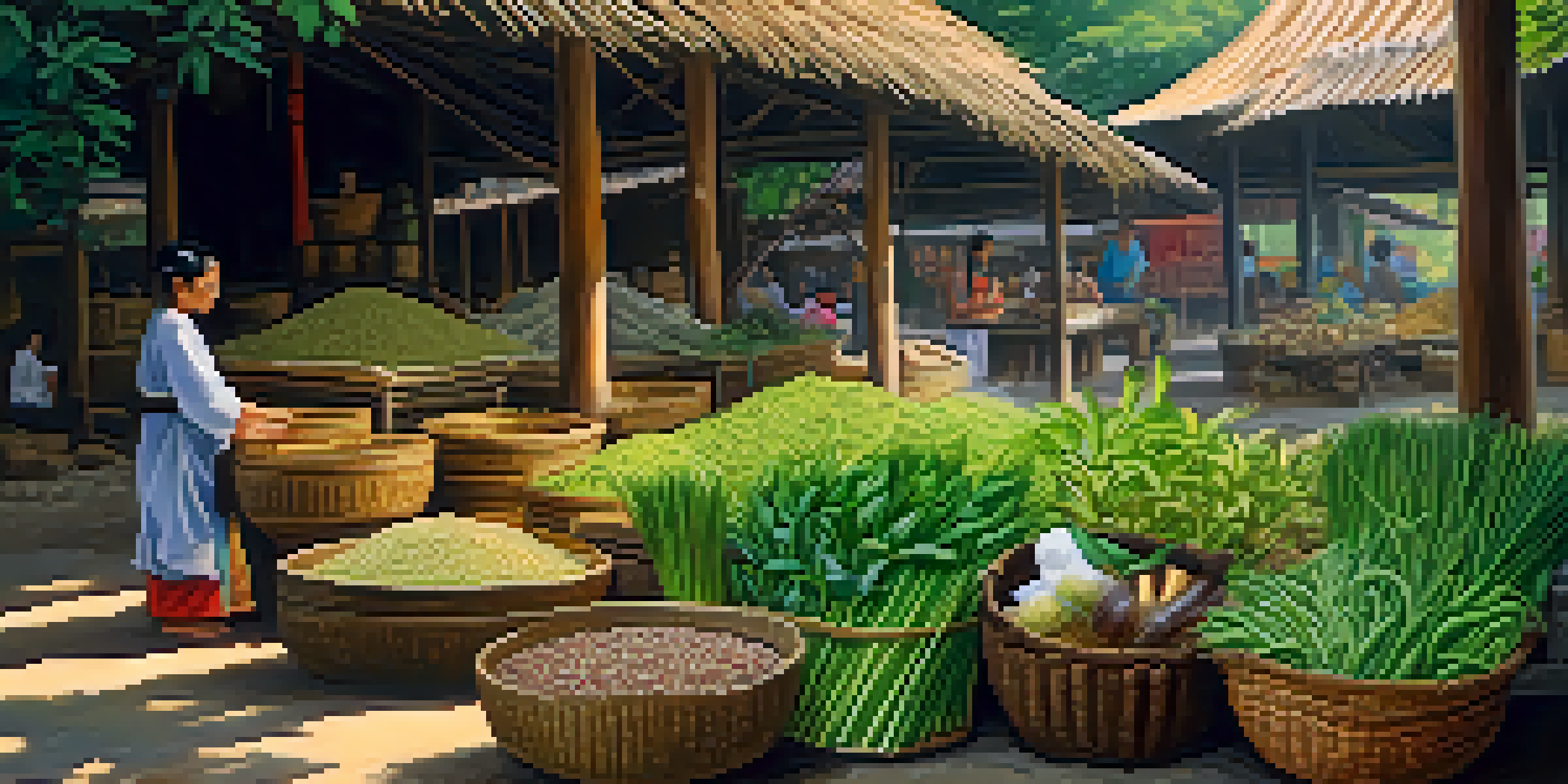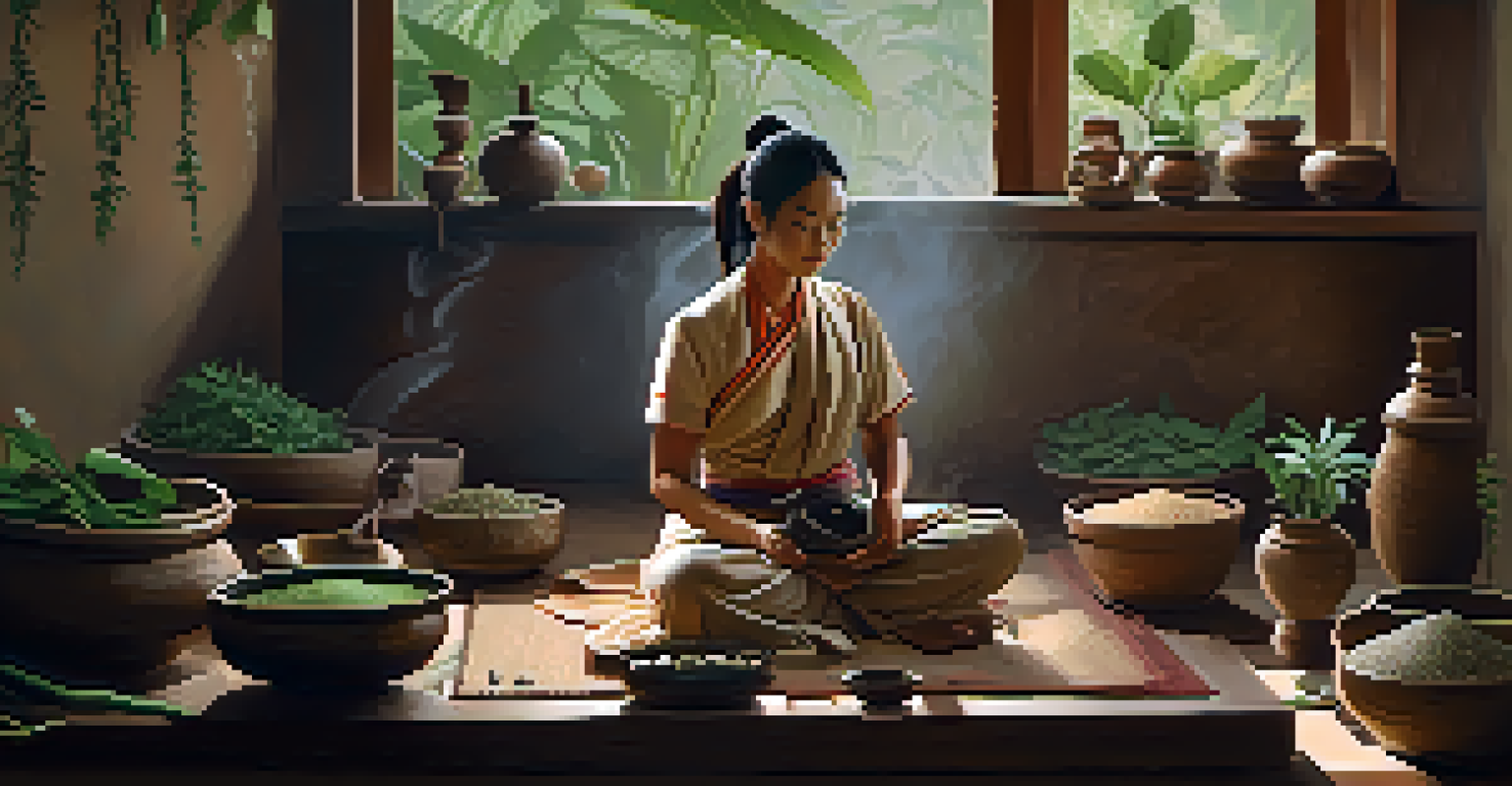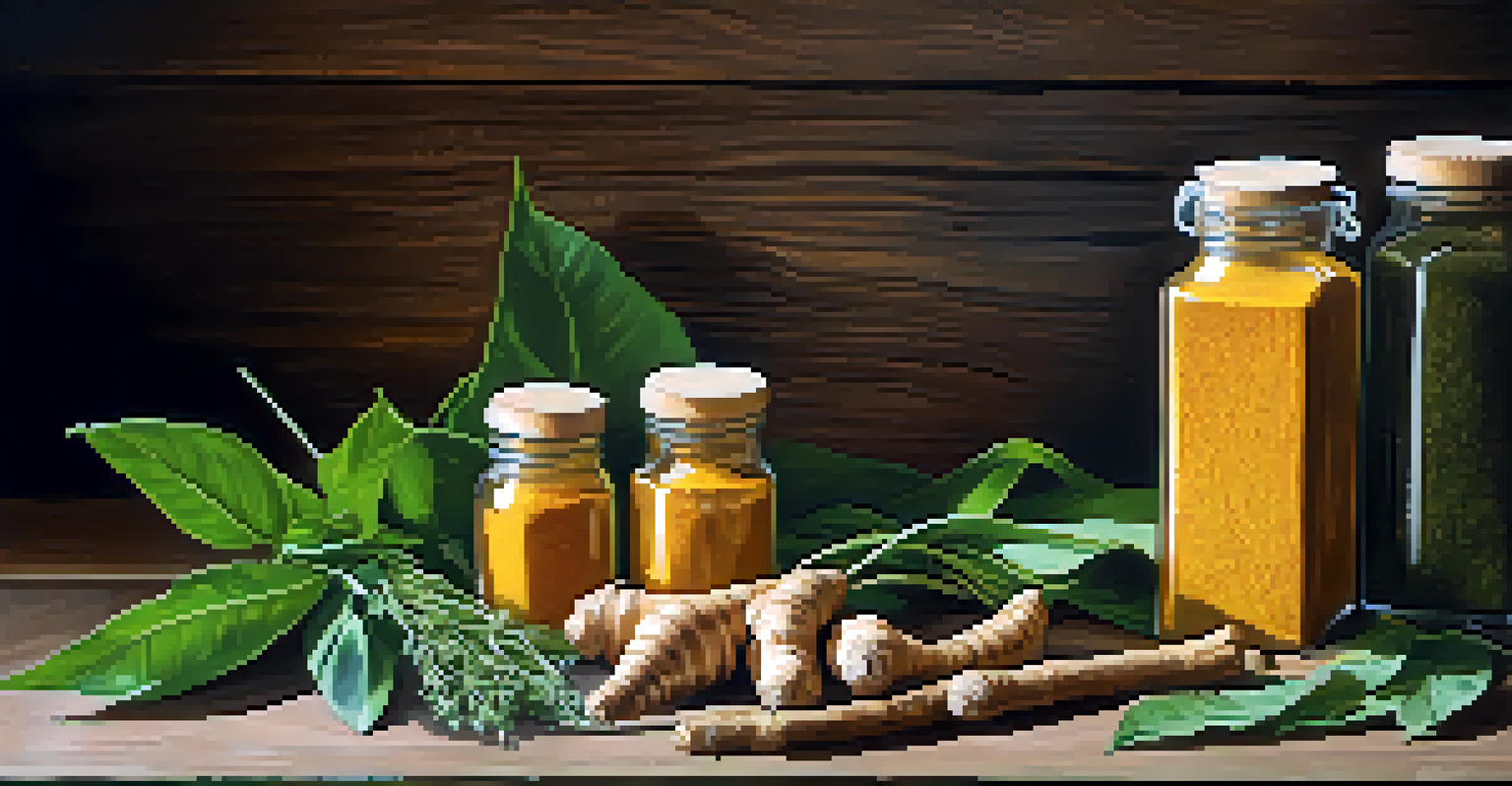The Role of Herbal Remedies in Traditional Thai Medicine

An Overview of Traditional Thai Medicine and Its Principles
Traditional Thai medicine (TTM) is a holistic healthcare system with roots in ancient practices that emphasize balance in the body, mind, and spirit. It incorporates elements of herbal medicine, massage, and spiritual healing, reflecting the rich cultural heritage of Thailand. At its core, TTM aims to restore harmony through the use of natural remedies, making it an integral part of Thai life.
The greatest wealth is health.
One of the fundamental principles of TTM is the concept of 'wind, bile, and phlegm,' which are believed to be vital bodily elements. Imbalances among these elements can lead to illness, prompting practitioners to use herbal remedies to restore equilibrium. This approach underscores the importance of prevention and wellness, rather than solely treating symptoms.
Herbal remedies play a vital role in TTM, offering a natural alternative to conventional medicine. By tapping into the healing properties of plants, Thai healers have developed a wealth of knowledge over generations, ensuring that these remedies remain relevant and effective in modern healthcare.
Key Herbs Used in Traditional Thai Medicine
The herbal repertoire in TTM is vast, but some key herbs stand out for their therapeutic benefits. For instance, lemongrass is revered not only for its culinary uses but also for its ability to relieve digestive issues and provide a soothing effect on the body. Similarly, ginger is commonly used to alleviate nausea and improve circulation, showcasing how everyday plants can offer medicinal properties.

Another essential herb is turmeric, known for its anti-inflammatory and antioxidant effects. It's often incorporated into remedies to support joint health and boost the immune system. This highlights the connection between food and medicine in Thai culture, where culinary ingredients are also viewed as healing agents.
Holistic Approach to Health
Traditional Thai medicine integrates herbal remedies, massage, and meditation to promote overall well-being.
Additionally, holy basil, or 'kraphao,' is celebrated for its adaptogenic qualities, helping the body cope with stress. This herb exemplifies the holistic approach of TTM, as it addresses not just physical ailments but also emotional and mental well-being.
The Integration of Herbal Remedies with Other Treatments
In TTM, herbal remedies are often combined with other treatment modalities, such as traditional massage and meditation. This integrative approach ensures that healing is comprehensive, addressing multiple aspects of a person's health. For instance, while herbal teas may soothe physical discomfort, massage can enhance circulation and promote relaxation.
Nature itself is the best physician.
The synergy between herbal remedies and practices like yoga or meditation further exemplifies the holistic philosophy of TTM. Together, they work to balance energy flows in the body, leading to improved health outcomes. This demonstrates how TTM sees patients as whole beings, rather than isolated symptoms.
Ultimately, the combination of various treatments illustrates the versatility of herbal medicine within TTM. Practitioners tailor their approaches to each individual's needs, ensuring that both physical and emotional health are prioritized.
The Role of Herbal Remedies in Preventative Health
Preventative health is a cornerstone of TTM, and herbal remedies play a significant role in this philosophy. Rather than waiting for illness to strike, many Thai people incorporate herbs into their daily routines for maintenance and wellness. This proactive approach helps to bolster the body’s defenses against diseases.
For example, regularly consuming herbal infusions like ginger tea can help fortify the immune system, making one less susceptible to colds and other ailments. Such practices reflect a deep-rooted belief in the power of nature to support health and longevity.
Preventative Health Focus
Herbal remedies are used proactively in Thai culture to maintain health and prevent illness.
This focus on prevention through herbal remedies is increasingly relevant in today's fast-paced world, where stress and poor lifestyle choices contribute to health issues. By embracing these time-tested remedies, individuals can take charge of their well-being and foster a healthier lifestyle.
Cultural Significance of Herbal Remedies in Thailand
Herbal remedies are not just medical tools; they are deeply woven into the cultural fabric of Thailand. From family gatherings to community events, sharing herbal concoctions often symbolizes care and wellness among loved ones. This cultural aspect reinforces the communal ties that Thai people cherish.
Moreover, traditional healing practices, including the use of herbal remedies, are passed down through generations. Elders often share their knowledge with younger family members, ensuring that these traditions remain alive and respected. This intergenerational transmission of wisdom highlights the importance of herbal medicine in Thai identity.
The cultural significance of herbal remedies extends beyond individual health; it embodies a collective understanding of nature's healing power. It fosters a sense of pride among Thai people, who recognize their heritage and the wisdom embedded in their traditions.
Modern Research and Validation of Thai Herbal Remedies
As the world turns its gaze towards natural healing, modern research is beginning to validate the efficacy of Thai herbal remedies. Scientific studies are increasingly exploring the active compounds found in traditional herbs, providing evidence for their health benefits. This intersection of tradition and science is paving the way for a new understanding of herbal medicine.
For instance, research has shown that compounds in turmeric can reduce inflammation, aligning with its use in TTM for joint pain. Such findings not only support the claims made by traditional practitioners but also help bridge the gap between ancient wisdom and contemporary medicine.
Cultural Heritage of Healing
The use of herbal remedies is deeply embedded in Thai culture, symbolizing care and communal ties.
This validation is crucial in promoting the acceptance of herbal remedies in broader healthcare discussions. As more studies emerge, it reinforces the notion that TTM and its herbal components deserve a place in modern health practices.
Challenges Facing Herbal Remedies in Contemporary Medicine
Despite the growing interest in herbal remedies, there are challenges that need to be addressed in contemporary medicine. One major concern is the standardization of herbal products, which can vary greatly in potency and quality. Ensuring that patients receive consistent and safe herbal treatments is essential for their effectiveness.
Additionally, there is often skepticism surrounding herbal remedies among some healthcare professionals. This skepticism can stem from a lack of understanding of traditional practices and the need for more rigorous scientific studies. Bridging this gap requires open dialogue and education about the benefits and limitations of herbal medicine.

Finally, the rise of commercialization of herbal products can lead to overharvesting and environmental concerns. It's vital to promote sustainable practices to protect the natural resources that are the foundation of these remedies, ensuring they remain available for future generations.